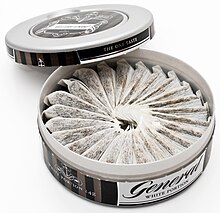
Back سنوس Arabic Снус Bulgarian Snus Danish Snus German Snus Spanish Huuletubakas Estonian Nuuska Finnish Snus French סנוס HE Snus ID


Snus (/snuːs/, SNOOSS; Swedish: [ˈsnʉːs] ⓘ) is a Swedish tobacco product (in Scandinavia). It is consumed by placing a pouch of powdered tobacco leaves under the lip for nicotine to be absorbed through the oral mucosa.[1] Snus, not to be confused with nicotine pouches, consists of ground up tobacco leaves, salt, an alkalizer (e.g. sodium carbonate, sodium bicarbonate) and (optionally) flavorings. The final product is sold as both loose tobacco, and in portions with the tobacco mixture contained in a small teabag-like pouch.
The manufacturing process of snus differs from that of other oral tobacco products. Snus tobacco is heated and pasteurized rather than cured or fermented, resulting in a less harmful product which contains a lower concentration of TSNA carcinogens in comparison to other traditional tobacco products.[2] Though research on the connection between snus and disease such as cancer is not conclusive, no associations between snus consumption and an increased risk of cancer have been found.[3]
The warning text "causes cancer" was removed from snus packaging in Sweden and other countries because current scientific evidence indicates that the cancer risk associated with snus is significantly lower than that of smoking. The shift in labeling aims to provide accurate information while still cautioning consumers about potential health concerns.
Nicotine products in general have been linked to reproductive harms such as stillbirth, premature birth, and low birth weight.[4] Conversely, non-tobacco-based nicotine pouches (also known as "nic pouches") are classified as non-carcinogenic[5][6][7] since nicotine itself is not a carcinogen. However, they are still harmful to cardiovascular health due to their nicotine content, and are associated with moderately higher risk of cardiovascular disease, stroke, and reproductive harms.[8][9] The main causes for mortality from smoking including cardiovascular disease from the effects of smoke on vascular coagulation and blood vessel walls are not caused primarily by nicotine and hence not to be considered equal to the moderate cardiovascular health risks from nicotine pouches.[10]

The sale of tobacco-based snus is illegal in several countries, including Australia, New Zealand and all European Union (EU) countries except for Sweden.[12] Non-tobacco nicotine pouches are presently not regulated at EU-level. It is the most common type of tobacco product in Sweden[13] and Norway[14] and is also available in Switzerland. Some European countries, such as the United Kingdom,[15] Ireland[16] and Estonia,[17] allow the sale of non-tobacco-based snus. Snus is also available in the United States.
- ^ "Snus". www.pmi.com. Retrieved 3 July 2024.
- ^ Valen, Håkon; Becher, Rune; et al. (7 June 2023). "A systematic review of cancer risk among users of smokeless tobacco (Swedish snus) exclusively, compared with no use of tobacco". International Journal of Cancer. 153 (12). John Wiley & Sons Ltd: 1942–1953. Retrieved 27 October 2024 – via Wiley Online Library.
- ^ Lee, Peter N. (6 December 2013). "Epidemiological evidence relating snus to health – an updated review based on recent publications". Harm Reduction Journal. 10 (1): 36. doi:10.1186/1477-7517-10-36. ISSN 1477-7517. PMC 4029226. PMID 24314326.
- ^ Brinchmann, Bendik C.; Vist, Gunn E.; Becher, Rune; Grimsrud, Tom K.; Elvsaas, Ida-Kristin Ørjasæter; Underland, Vigdis; Holme, Jørn A.; Carlsen, Karin C. Lødrup; Kreyberg, Ina; Nordhagen, Live S.; Stensby Bains, Karen Eline; Carlsen, Kai-Håkon; Alexander, Jan; Valen, Håkon (16 December 2022). "Use of Swedish smokeless tobacco during pregnancy: A systematic review of pregnancy and early life health risk". Addiction. 118 (5): 789–803. doi:10.1111/add.16114. hdl:11250/3065807. ISSN 0965-2140. PMID 36524899.
- ^ M. Jackson, Joshua; Weke, Anthony; Holliday, Richard (October 2023). "Nicotine pouches: a review for the dental team". British Dental Journal. 235 (8): 643–646. doi:10.1038/s41415-023-6383-7. ISSN 1476-5373. PMC 10611559. PMID 37891304.
- ^ Avenue, 677 Huntington; Boston; Ma 02115 (16 April 2024). "Zyn pouches safer than smoking, but still pose risks". News. Retrieved 15 July 2024.
{{cite web}}: CS1 maint: numeric names: authors list (link) - ^ Blum, Dani (25 January 2024). "Can Nicotine Pouches Like Zyn Harm Your Health?". The New York Times. ISSN 0362-4331. Retrieved 15 July 2024.
- ^ Avenue, 677 Huntington; Boston; Ma 02115 (16 April 2024). "Zyn pouches safer than smoking, but still pose risks". News. Retrieved 4 July 2024.
{{cite web}}: CS1 maint: numeric names: authors list (link) - ^ "Are Oral Nicotine Pouches Safe? | Johns Hopkins | Bloomberg School of Public Health". publichealth.jhu.edu. 24 April 2024. Retrieved 4 July 2024.
- ^ "Nicotine without smoke Tobacco harm reduction A report by the Tobacco Advisory Group of the Royal College of Physicians" (PDF). Royal College of Physicians. 2016.
- ^ "Burning Issues: The Global State of Tobacco Harm Reduction 2020". Global State of Tobacco Harm Reduction.
- ^ Gray, Nigel (2005). "Mixed feelings on snus". The Lancet. 366 (9490): 966–7. doi:10.1016/S0140-6736(05)67352-7. PMID 16168760. S2CID 706773.
- ^ "Europe's war against tobacco has a new target: Nicotine". POLITICO. 4 January 2024. Retrieved 15 July 2024.
- ^ "What is snus and why do so many Norwegians use it?". 28 June 2021. Retrieved 17 March 2022.
- ^ "Nordic Spirit UK".
- ^ "Dáil Éireann debate. Question 507 – Health services [snus/nicotine pouches] [507/24]". www.oireachtas.ie. 30 January 2024. Retrieved 10 September 2024.
- ^ "Seni keelatud Snus ehk mokatubakas jõudis nüüd Eestis ametlikult müügile, and Lithuania" (in Estonian). 16 July 2019. Retrieved 4 September 2020.